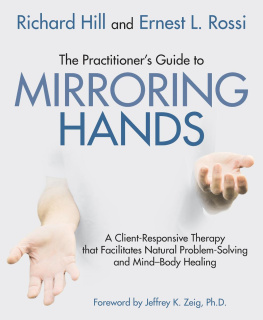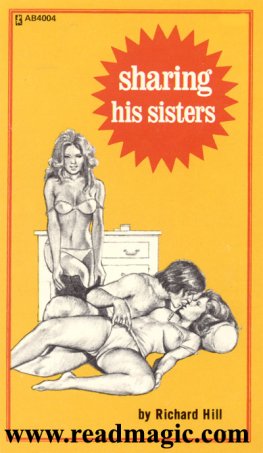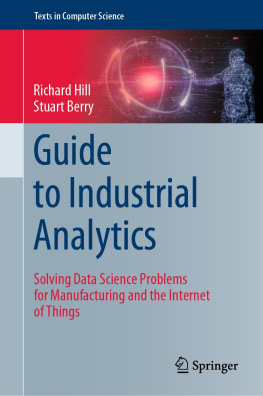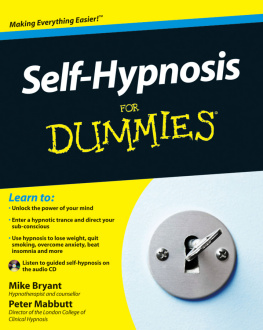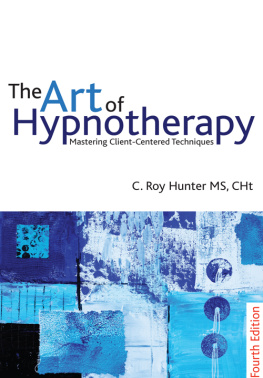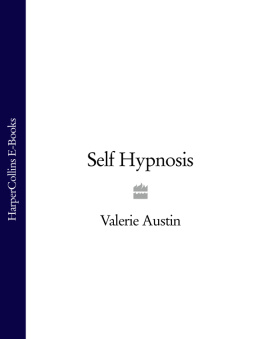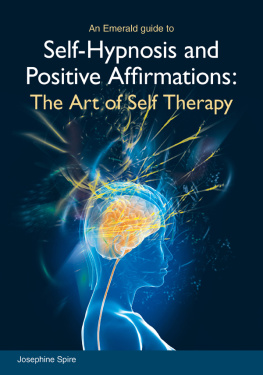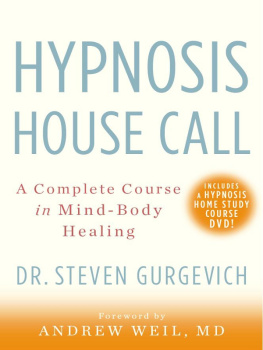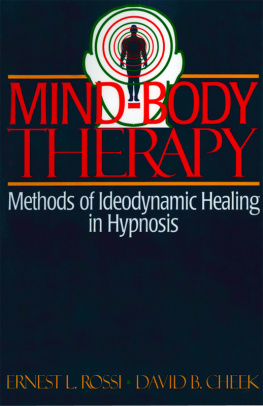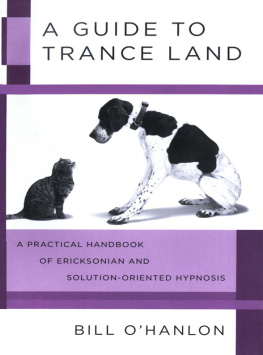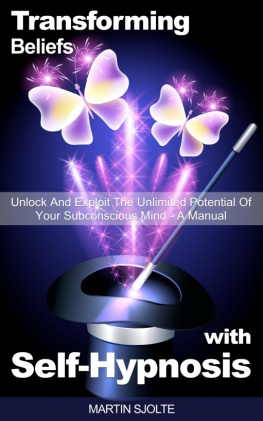Praise for The Practitioners Guide to Mirroring Hands
Picasso once remarked that art is the elimination of the unnecessary. Ernest L. Rossis Mirroring Hands method is brilliant in its simplicity and elimination of the unnecessary, yet is complex beyond belief in the results it can engender. This method can eliminate any resistance you may encounter in the change process and can evoke deep inner wisdom, often in a very short time.
Richard Hill has facilitated and expanded this guide to using Mirroring Hands in such a way that makes it accessible for all.
Bill OHanlon, author of Solution-Oriented Hypnosis and Do One Thing Different
In The Practitioners Guide to Mirroring Hands, Richard Hill and Ernest L. Rossi honor the wisdom of the courageous people who come to us seeking healing. They offer deep wisdom about the inherent health that lies within our clients and the support we can provide to allow that health to come forward. A wonderful contribution!
Bonnie Badenoch, Ph.D., marriage and family therapist, author of Being a Brain-Wise Therapist and The Heart of Trauma
Within the crucible of a technique Hill and Rossi call Mirroring Hands, The Practitioners Guide to Mirroring Hands shares a storehouse of practical insight, scientific theory, and clinical wisdom. In the process they challenge accepted assumptions and synthesize complex principles, all the while encouraging clinicians to learn to listen to their inner voice.
The Practitioners Guide to Mirroring Hands is a warm and fascinating adventure in which you get to know two explorers of the mind and learn about the history of psychotherapy while gaining practical knowledge. You may not agree with everything the authors say, but I suspect that you will respect and enjoy their unique blend of complexity, depth, and self-insight so often missing from contemporary discussions.
Louis Cozolino, Ph.D., author of The Neuroscience of Psychotherapy, The Neuroscience of Human Relationships, The Making of a Therapist, and Why Therapy Works
What a fascinating book! Starting as an easy read, it gently descends to deep levels. Richard Hill brings straightforward clarity to Ernest L. Rossis genius, and their combined work brings contemporary insight into ideas pioneered by my father, Milton H. Erickson.
The Practitioners Guide to Mirroring Hands will inspire ongoing discoveries by others and carry this important work into tomorrow.
Roxanna Erickson-Klein, Ph.D., R.N., author of Hope and Resiliency and Engage the Group, Engage the Brain, editor of The Collected Works of Milton H. Erickson
Have you ever wondered how to help a client access their unconscious? Building on the work of Milton H. Erickson, Ernest L. Rossi developed Mirroring Hands to do just that, and, along with Richard Hill, he has now brought it to you. Not only do Hill and Rossi give clear step-by-step instructions for how to use Mirroring Hands, but they also lay out the framework for understanding the dynamic power of this tool.
The Practitioners Guide to Mirroring Hands is a well-rounded resource full of practical applications and illustrative casebook studies. Readers will find themselves both informed and empowered by this guide.
Ruth Buczynski, Ph.D., licensed psychologist, President, National Institute for the Clinical Application of Behavioral Medicine
Providing extensive research background for the theories on which the Mirroring Hands technique is based, The Practitioners Guide to Mirroring Hands is an outstanding manual accomplished with precision and clarity. It takes readers on a journey through neurophysiological and genomic discoveries and offers intriguing speculations on quantum influences which may give readers a glimpse of the inevitable future of psychotherapy.
Stephen Lankton, M.S.W., D.A.H.B., editor-in-chief, American Journal of Clinical Hypnosis, author of The Answer Within and Tools of Intention
There is plenty of research and ideas presented here that made me think new thoughts, and you cant ask much more from a book. Im sure The Practitioners Guide to Mirroring Hands will be one I return to repeatedly.
Trevor Silvester, Q.C.H.P.A. (Reg), N.C.H. (Fellow), H.P.D., Training Director, The Quest Institute Ltd, author of Cognitive Hypnotherapy, Wordweaving, and The Question is the Answer
The Practitioners Guide to Mirroring Hands really does do magnificent credit to Richard Hills documentation and to his dedication in uncovering the genius of Rossi and Erickson, and will provide you with a never-ending source of wisdom on your professional journey in the therapy room. The authors should be commended for this text, which obviously sets out to achieve a quite remarkable feat in its presentation of the Mirroring Hands process, and it doesnt disappoint. It is indeed a tour de force which will and should become a classic.
Dr. Tom Barber, founder, Contemporary College of Therapeutic Studies, educator, psychotherapist, coach, and bestselling author
This book honors two extraordinary women:
Kathryn Lane Rossi and Susan Jamie Louise
Davis who have not only made our lives an
immeasurable pleasure, but have also been a
source of healing for many thousands of people.
This volume spans many decades of growth and change, so acknowledging everyone who has made a contribution is probably impossible. We would like to begin with a heartfelt thank you to all our patients and clients over the years who have been, in a very special way, co-creators in the emergence and development of Mirroring Hands. It almost goes without saying that we equally acknowledge the numinous, and continuing, presence of Milton H. Erickson.
Richard Hill extends the first acknowledgment and his unqualified gratitude to Ernest Rossi, who has facilitated his becoming as a therapist for more than a decade. Starting a new career in midlife is so much more possible when surrounded by the best.
We must, again, thank our wives, Kathryn Rossi and Susan Davis, for their enormous contribution, on both professional and personal levels. Almost as dedicated has been Michael Hoyt, in San Francisco, who has generously read and re-read progressive drafts, providing invaluable guidance and advice. Many thanks to Nick Kuys, from Tasmania, Australia, for his kindly role play as our quintessential practitioner, helping us to appreciate what was interesting and important. A very special thanks to Jeff Zeig for contributing the foreword. He is an icon of professional excellence throughout the world and tireless in his work as founder and board member of the Milton H. Erickson Foundation.
We have been befriended and gently encouraged by wonderful people, including John Arden, Bonnie Badenoch, Rubin Battino, Steve Carey, Giovanna Cilia, Lou Cozolino, Mauro Cozzolino, Matthew Dahlitz, Jan Dyba, Roxanna Erickson-Klein, John Falcon, Bruce and Brigitta Gregory, Salvatore Iannotti, Paul Lange, Stephen Lankton, Paul Leslie, Scott Miller, Michael Munion, Carmen Nicotra, Bill OHanlon, Kirk Olson, Debra Pearce-McCall, Susan Sandy, Dan Siegel, Lawrence Sugarman, Reid Wilson, Michael and Diane Yapko, and Shane Warren. There are more we hold dear to our hearts, including colleagues and friends at the Global Association for Interpersonal Neurobiology Studies (GAINS) who are more family than just friends; the wonderful people at the Milton H. Erickson Foundation; and Venkat Pulla and our Strengths Based Practice Social Work community in Australia, Asia, and the Subcontinent. It has been a wonderful journey. Thank you all.

